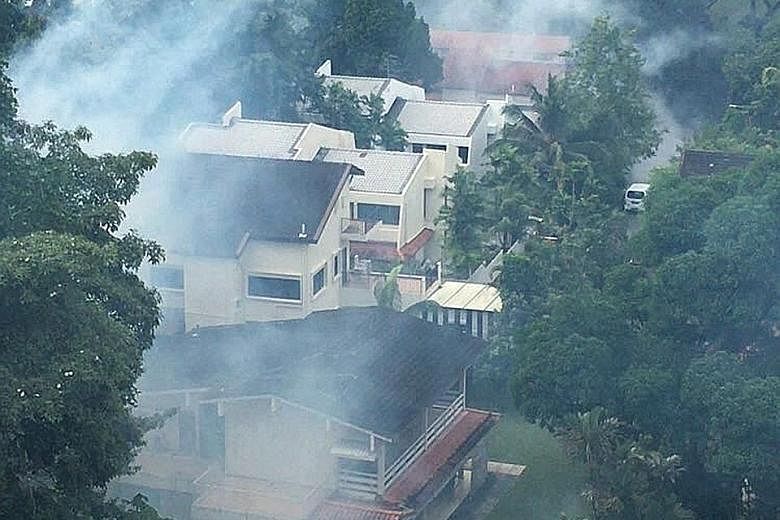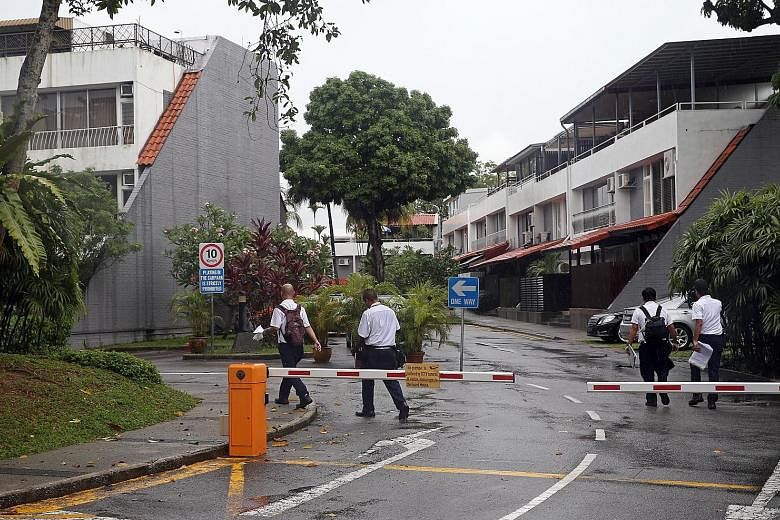Schools in the vicinity of Watten Estate are taking extra precautions after it was revealed on Friday that a man living in the area had contracted the Zika virus.
The National Environment Agency (NEA) is working with Raffles Girls' Primary School, Nanyang Girls' High School and the National Junior College to fumigate their compounds.
The schools will also provide insect repellent upon request.
Speaking on the sidelines of a community event yesterday morning, Acting Minister for Education (Schools) Ng Chee Meng said that as these schools take measures to prevent mosquito breeding, students should also use repellent and see a doctor if they develop Zika-like symptoms.
Yesterday, the typically quiet Watten Estate in Bukit Timah was a hive of activity as 160 officers, contractors and volunteers worked to stamp out the mosquito menace.

Apart from fogging the area, they also inspected homes and public areas, and will be stepping up the frequency of cleaning and oiling drains to prevent mosquitoes from breeding.
Between the landed homes, condominiums and walk-up apartments are several small parks and playgrounds, which will also be the focus of anti-mosquito efforts, with NEA saying it will work together with the National Parks Board.
"They were out in full force - there was an army of officers around," said banker and investor John Westnedge, 52, who lives in the area.
"They were fogging the place, opening the street gutters and clearing the drains, and going from door to door."
-
Likely more S-E Asia cases than reported: WHO
-
Sporadic Zika cases have been found in other Asian countries including Vietnam, Laos, the Philippines, Thailand, Vietnam, Indonesia, South Korea and China.
But there have been no reports of outbreaks in Asia.
The Philippines, for example, reported its fifth case on Friday, while Vietnam saw its first two infections last month, Xinhua news agency said.
It also reported in March that China had 12 cases of the virus.
While the number of reported cases is low in Asia, World Health Organisation (WHO) officials have said the virus is likely to have spread far more widely in South-east Asia than the number of cases suggests.
This is partly because detection of the virus is often delayed, its symptoms being similar to those of other mosquito-borne viruses such as dengue and chikungunya.
South-east Asia's growing urban centres, tropical climate, and often poor waste management are factors that increase the risk of a Zika epidemic.
The region is also susceptible to biannual monsoon seasons that increase breeding sites for the Aedes mosquito, which is also responsible for spreading the dengue and chikungunya viruses.
Globally, 58 countries and territories so far have reported continuing mosquito-borne transmission of the Zika virus, according to the WHO website.
Brazil is the epicentre of the outbreak, with around 1.5 million people infected since last year. The virus is spreading throughout most of South America, Central America and the Caribbean and in Mexico, said WHO.
Zika symptoms are similar to dengue and include fever, rashes, joint and muscle aches, and headaches, but infections tend to be milder.
But the virus has also been linked to serious birth defects in children whose mothers were infected while pregnant with them.
Infectious diseases expert Hsu Li Yang said that statistically speaking, the Zika virus will be transmitted locally "sooner or later".
"The epidemic in the Americas is huge, sustained and out of control," he told The Sunday Times, "and there are, on average, more than 5,000 tourists coming to Singapore from that part of the world every month."
But he also believes that any Zika situation will resemble chikungunya - which is also spread by the Aedes mosquito - rather than dengue.
Between the start of the year and last week, there have been 7,488 dengue cases, but only seven chikungunya cases.



